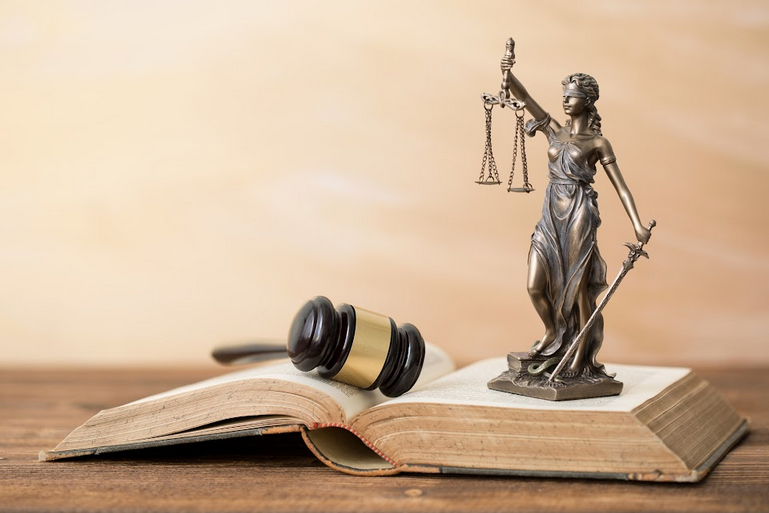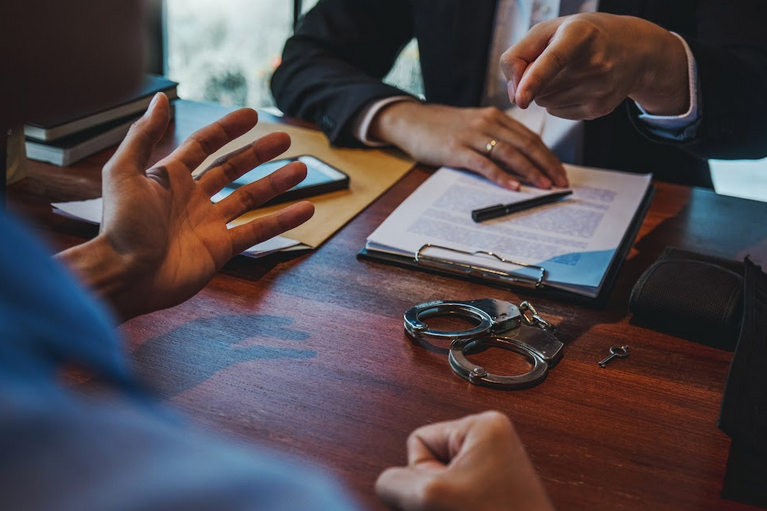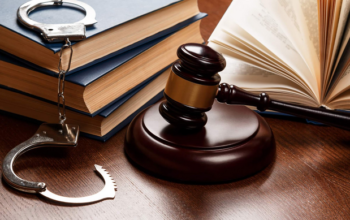Few expect to face criminal charges, but it’s a situation that can arise unexpectedly. The fear, uncertainty, and overwhelming sense of the unknown often follow. Regrettably, this situation can impact anyone. In these instances, your immediate action should be to secure a lawyer to clarify the process for the accused.
Facing criminal charges — whether it be you or someone you know — requires a crucial initial step. This guide seeks to simplify the legal journey, offering a clear path through which helps you make the first move. Continue reading to grasp the workings of the legal system and manage your circumstances effectively.
Understanding The Law And Your Rights
1. Types Of Criminal Charges
Criminal charges usually fall into two main groups: felonies and misdemeanors. Felonies, the more severe of the two, can lead to imprisonment exceeding a year and include crimes like grand theft, drug violations, and violent acts.
On the other hand, misdemeanors are less grave, usually resulting in reduced jail time or monetary fines. Misdemeanor charges can arise from actions like reckless driving, trespassing, or shoplifting items of minor value.
Understanding the distinction between the two charges is vital, as it affects the legal process and potential penalties. A reputable criminal defense lawyer in Pasadena or whichever city you’re from should be able to guide you
2. Constitutional Rights of the Accused
Even if charged with a criminal offense, you, as a citizen, still have your rights to uphold. The Constitution safeguards your rights during criminal proceedings with three specific amendments.
Firstly, the Fourth Amendment safeguards against unjust searches and seizures, which is essential in investigative scenarios. The Fifth Amendment provides for grand jury involvement, prevents double jeopardy — or being tried twice for the same offense — and protects against self-incrimination. Furthermore, the Sixth Amendment guarantees a prompt and fair trial, including the right to legal counsel, a jury, and knowledge of your accusers.
3. The Arrest Process
Law enforcement must inform you of your Miranda rights upon arrest. These rights include choosing to remain silent and securing legal representation. It’s critical to exercise these rights to avoid self-incrimination.
During an arrest, it’s important to remain calm and compliant. Resisting arrest can lead to additional charges. Bear in mind that your statements can be utilized in court proceedings, so it’s advisable to communicate only when your lawyer is present.
4. Pretrial Procedures
The initial stages after your arrest include an arraignment where charges are formally presented. After arrest, you’ll undergo the booking process at the police station, which includes recording your personal details, taking fingerprints, and photographing you for identification. This part is where you must also surrender personal property to be confiscated. You must cooperate during this step, as non-compliance may result in other charges.
Another part of the pretrial procedure is knowing your bail eligibility and options. Bail requires the arrested individual to pay a predetermined sum in exchange for release. However, that doesn’t mean complete freedom. You must still appear in court for all your scheduled proceedings. A judge will decide how much bail to post. Note that in some cases, you may not receive your bail amount immediately after booking because of the judge’s schedules or holidays.
Building Your Defense Strategy
1. Choosing Legal Representation
Selecting the right legal representation is a must. At your arraignment, you’ll not only be asked about legal representation but also formally charged and required to enter a plea to the charges. A criminal defense lawyer will advocate for you and protect your best interests. They’ll also help you gather critical evidence, draft documents such as appeals and legal briefs, and negotiate plea deals, settlements, or punishments.
Private lawyers often offer more personalized attention to their clients. But if you lack the financial means, public defenders are available for those unable to afford private lawyers. Legal aid organizations can also provide valuable assistance, especially for low-income individuals.
2. Gathering Evidence
Building a robust defense often hinges on the evidence you gather. This includes collecting witness statements, which can provide alternate accounts of the alleged incident. Documentation, such as emails, texts, or photos, can also be valuable.
If physical evidence is involved, it must be handled correctly to maintain its integrity. Your lawyer can guide you in this process, ensuring evidence collection meets legal standards. This careful approach protects the validity of your defense.
3. Working with Your Lawyer
Open and honest communication with your lawyer will aid you in your case. Provide them with all relevant information, as withholding details can hinder your defense. Your lawyer’s guidance and defense strategies are based on the information you share with them.
Trust in your lawyer’s expertise. They understand the legal system and can navigate its complexities. A good lawyer addresses your questions and concerns openly, keeping you well-informed throughout the process.
4. Developing a Defense Strategy
A well-crafted defense strategy is essential for your case. It may involve challenging the prosecution’s evidence, presenting an alibi, or demonstrating mitigating circumstances. Your defense should align with the specifics of your case and legal precedents.
Consideration of plea bargains is also a part of this strategy. A plea bargain can result in reduced charges or a lighter sentence. However, it requires careful deliberation, as it involves admitting guilt to a lesser offense.

The Courtroom Experience
1. Understanding Court Roles
It’s best to understand who’s who and what they do to gain a clearer picture of your trial’s proceedings, making it less intimidating. In court, each participant has a specific role. The judge oversees the trial, ensuring legal procedures are followed. The prosecutor represents the state, seeking to prove the charges against you. Your defense lawyer advocates on your behalf, challenging the prosecution’s case and presenting your defense.
2. Trial Procedures
Trials follow a structured process. Plea agreements are usually negotiated and settled before the trial begins, often during pretrial conferences. The defendant must admit their guilt to the court to potentially reduce their penalty. Occasionally, the defendant might admit guilt in return for facing a less severe charge as part of a plea bargain.
Opening statements set the stage, followed by witness examinations where evidence is presented. Closing arguments then summarize each side’s case before the jury deliberates to reach a verdict.
3. Maintaining Composure and Professionalism
As with many formal proceedings, courtroom behavior impacts perceptions. Your demeanor in court affects how the judge, jury, and others perceive you. Staying calm and composed, even under stress, reflects positively on your character. This composure can influence the court’s view of your credibility.
Professionalism extends to your attire and interactions in court. Dressing appropriately shows respect for the court. Ethical behavior, including politeness and honesty, also benefits you in a courtroom setting.
Sentencing And Beyond
1. Possible Sentencing Outcomes
The range of sentencing in criminal matters is broad, influenced by the offense’s gravity and any previous criminal record. For serious crimes, imprisonment is a common outcome, with the duration depending on the crime’s nature and state guidelines. The court might impose probation for minor offenses, permitting you to reside in the community with certain restrictions, or order fines, which are monetary penalties.
Besides community service and rehabilitation, alternative sentencing might include deferred adjudication, where sentencing is postponed, or specialized courts like drug courts for substance-related offenses. Judges often consider factors like your role in the crime, remorse shown, and potential for rehabilitation. Knowledge of these options helps you prepare for different scenarios and their implications for your future.
2. Appeals Process
Conviction entitles you to challenge the verdict or sentence through an appeal. This process entails a superior court examining your case for potential legal missteps during the initial trial. It’s important to note that appeals are not re-trials but reviews of the legal process followed in your case.
Grounds for appeal can include significant legal errors during the trial, newly discovered evidence, or ineffective assistance of counsel, among others. This could consist of improper admission of evidence, incorrect jury instructions, or inadequate legal representation. Familiarize yourself with the appeals process and its timelines, as there are often strict deadlines for filing an appeal.
-
Rebuilding Your Life
After facing criminal charges, you should also prioritize rebuilding your life. This process often involves restoring relationships damaged by the legal ordeal and finding a stable job, which can be challenging with a criminal record. You can also consider exploring expungement or record sealing. These processes remove or conceal your criminal record from public view, aiding in employment and social reintegration.
Accessing community resources and support groups can be instrumental and keep your mind at ease in this phase. Proper rehabilitation and reintegration into society are vital for a successful transition. This might include educational opportunities, vocational training, or counseling services. Actively utilizing available support and resources showcases your dedication to reform and can significantly impact your long-term success and well-being.
Conclusion
Being charged with a crime, especially if you believe in your innocence, can profoundly affect your mental and physical health. Upon facing a criminal charge, promptly seek legal counsel to understand the law and collaboratively develop a strong defense strategy before heading to court. Knowing the basics of navigating the process could provide a clear path for each step.
Though challenging, this situation is manageable with the right approach. Stay informed, seek support, and consult a certified lawyer or legal aid organization for personalized guidance during the proceedings. Your resilience and knowledge are your best allies in this journey.
Related Posts












